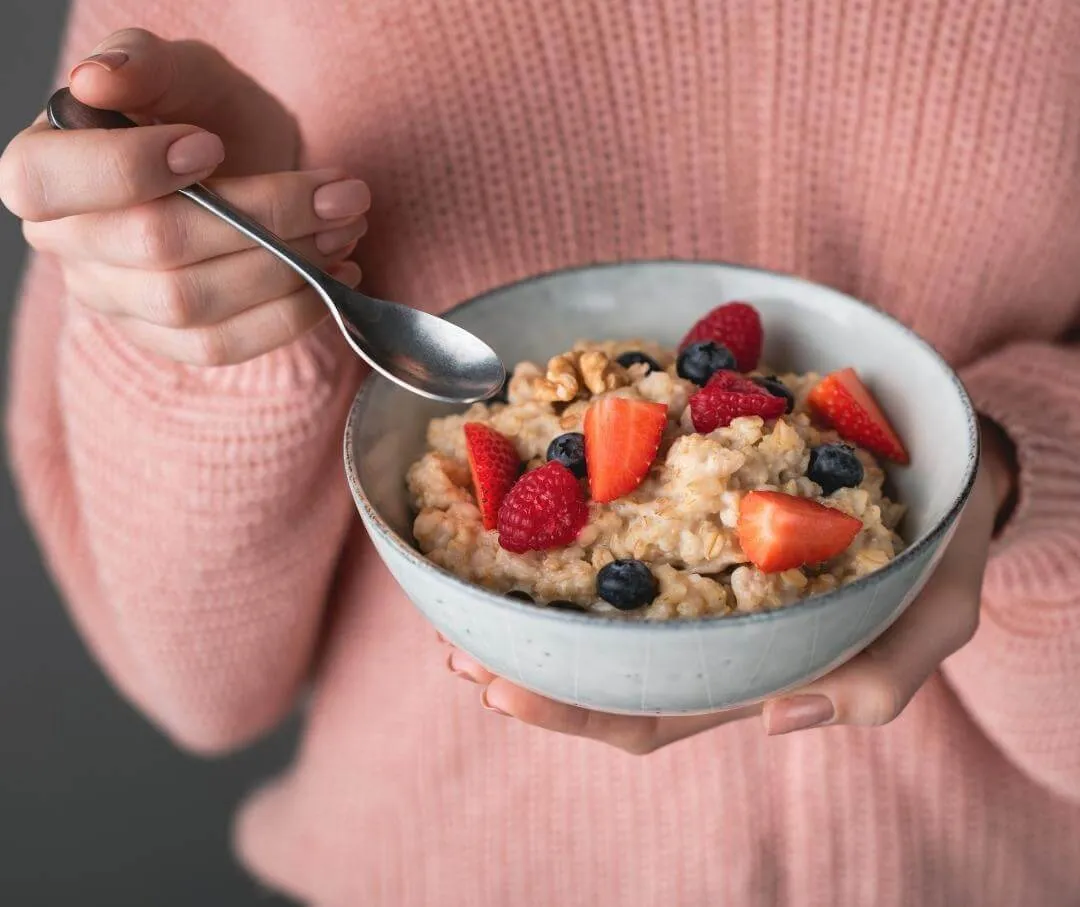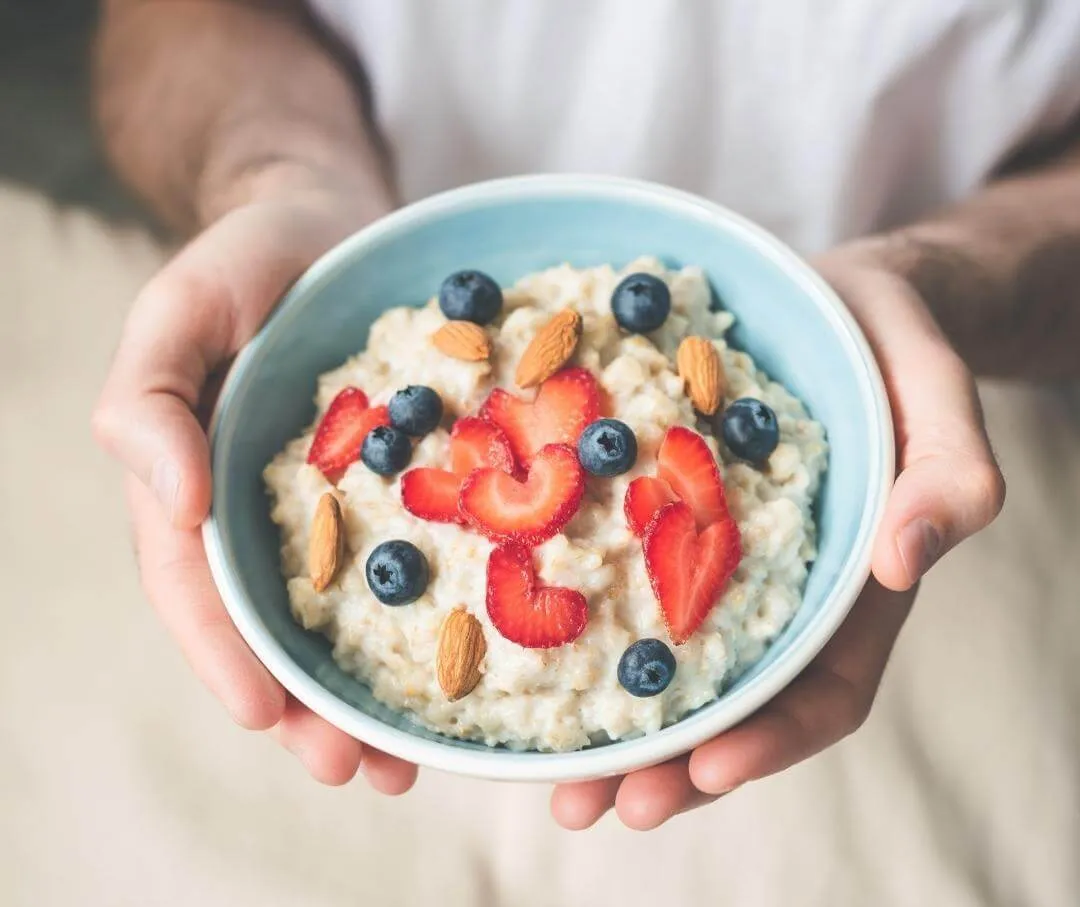Oatmeal, a wholesome and versatile breakfast option, is celebrated for its impressive nutritional profile and health benefits, particularly for individuals managing type 2 diabetes. Rich in fiber, specifically beta-glucan, oatmeal not only aids in stabilizing blood sugar levels but also significantly lowers cholesterol, benefitting heart disease. This nutrient-dense grain, packed with essential vitamins, minerals, and antioxidants, supports overall metabolic health. It is an excellent pick of cereals for those aiming to control their glucose levels and improve cardiovascular health.
{{mid-cta}}
What Are the Health Benefits of Oatmeal for Diabetes?
Balancing carbs is crucial for individuals with type 2 diabetes as it directly impacts blood glucose levels. Consuming the right amount of carbohydrates, paired with high-fiber foods like oatmeal, helps prevent blood sugar spikes and ensures steady energy levels throughout the day. A healthy diabetes diet emphasizes nutrient-dense foods, proper portion sizes, and a mix of macronutrients to maintain stable glucose levels and support overall well-being. By carefully managing carbs and incorporating fiber-rich options, individuals living with type 2 diabetes can achieve better blood sugar control and reduce the risk of complications.
Here are 5 benefits of oatmeal for diabetes, explained:
1. Stabilizes Blood Sugar Levels
Oatmeal is rich in dietary fiber, particularly beta-glucan, which slows down the digestion and absorption of carbohydrates, giving it a more favorable glycemic index. This helps prevent rapid spikes in blood glucose levels, promoting better blood sugar control.
2. Lowers Cholesterol
The beta-glucan in oatmeal binds with cholesterol-rich bile acids in the gut, reducing the amount of cholesterol absorbed into the bloodstream. This helps lower overall cholesterol levels, which is particularly beneficial for individuals living with diabetes and at higher risk for cardiovascular disease.
3. Supports Weight Management
Oatmeal is a low-calorie, high-fiber food that promotes a feeling of fullness and satiety. This can help individuals living with diabetes maintain a healthy weight, which is crucial for managing blood sugar levels and reducing the risk of diabetes-related complications.
4. Improves Insulin Sensitivity
Regular consumption of oatmeal may improve insulin sensitivity, allowing the body to use insulin more effectively. This is particularly beneficial for individuals with type 2 diabetes, as improved insulin sensitivity can help manage blood sugar levels more efficiently.
5. Provides Essential Nutrients
Oatmeal is a good source of essential vitamins and minerals such as magnesium, which plays a key role in glucose metabolism and insulin action. Ensuring adequate intake of these nutrients supports overall health and can aid in diabetes management.
What Are the Cons of Oatmeal for Diabetes?

Oatmeal is considered a nutritious and beneficial food for individuals with type 2 diabetes. Its high fiber content, particularly the soluble fiber beta-glucan, helps regulate blood sugar levels and lower LDL cholesterol, making it a staple in a healthy diabetes diet. Oatmeal also provides essential vitamins, minerals, and antioxidants, contributing to overall metabolic health and well-being. These benefits make it an excellent choice for most people, particularly those looking to improve insulin resistance and cardiovascular health.
However, while oatmeal has many advantages, it may pose some challenges for individuals with certain medical conditions, such as gastroparesis. Gastroparesis is a condition characterized by delayed stomach emptying, which can cause symptoms like nausea, vomiting, bloating, and abdominal pain. Whole grain foods, like oatmeal, can exacerbate these symptoms as the fiber takes longer to digest and may contribute to the formation of indigestible masses known as bezoars. For patients with gastroparesis, consuming whole-grain foods can increase discomfort and delay gastric emptying.
To manage symptoms effectively, it is often recommended that those with gastroparesis follow a diet that includes lower-fiber foods and smaller, more frequent meals. While oatmeal is generally a healthy option, individuals with gastroparesis may need to limit their intake or opt for other nutritious, lower-fiber alternatives that are easier to digest.
How Do You Prepare Oatmeal if You Have Diabetes?
Oatmeal comes in various forms, such as steel-cut, rolled, and instant, offering unique textures and preparation methods while providing similar health benefits for individuals with diabetes. Regardless of the type, all forms of oatmeal are rich in essential nutrients and soluble fiber, particularly beta-glucan, which plays a vital role in managing blood sugar levels and improving overall metabolic health. Eating oatmeal can be a valuable strategy for diabetes management, helping to stabilize glucose levels and promote cardiovascular well-being.
Here are six ways to prepare oatmeal:
- Classic Stove-Top Oatmeal: Cook rolled oats or steel-cut oats on the stove with water or low-fat milk. Stir in cinnamon and top with fresh berries and a drizzle of honey or maple syrup.
- Protein-Packed Overnight Oats: Mix old-fashioned oats with low-fat milk or a milk alternative, low-sugar protein powder, and a spoonful of chia seeds. Let soak overnight in the refrigerator, and add fresh berries or sliced almonds in the morning.
- Microwave Oatmeal: Combine old-fashioned oats with water or milk in a microwave-safe bowl. Cook for 1-2 minutes; stir in a scoop of low-sugar protein powder, and top with sliced bananas, a sprinkle of cinnamon, and a spoonful of peanut butter.
- Berry and Nut Oatmeal: Cook old-fashioned oats with water or a milk alternative. Stir in a handful of mixed berries and a tablespoon of chopped nuts. Finish with a sprinkle of cinnamon and a touch of honey.
- Savory Oatmeal: Prepare steel-cut oats with water or low-sodium broth. Top with a poached egg, avocado slices, and sautéed spinach. Sprinkle with a pinch of salt and pepper for a hearty, savory breakfast.
- Baked Protein Oatmeal: Mix old-fashioned oats with low-fat milk, a beaten egg, a scoop of low-sugar protein powder, and a dash of cinnamon. Pour into a baking dish and bake until set. Top with fresh berries or a dollop of Greek yogurt.
<p class="pro-tip"><strong>Learn More: </strong><a href=does-sugar-cause-type-2-diabetes>Does Sugar Cause Type 2 Diabetes?</a>.</p>
Oatmeal Preparation Options to Avoid if You Have Type 2 Diabetes

While oatmeal is generally nutritious and diabetes-friendly, certain preparation methods can reduce its benefits or even increase blood sugar levels. To maximize the health benefits of oatmeal, it's important to avoid common pitfalls. Here are some tips on what to avoid while preparing oatmeal.
- Prepackaged or Instant Oatmeal With Added Sweeteners: Instant oats often contain high amounts of added sugars and artificial flavors, leading to rapid spikes in blood sugar levels.
- Too Much-Dried Fruit: Dried fruits are concentrated sources of natural sugars and can significantly increase the carbohydrate content of your oatmeal, impacting blood sugar control.
- Excessive Sweeteners: Adding too much sugar, honey, or syrup can negate the health benefits of oatmeal and contribute to blood sugar spikes.
- Cream: Using cream instead of low-fat milk or milk alternatives adds unnecessary saturated fats and calories, which can be detrimental to overall health and weight management.
- Sugary Toppings: Avoid adding sugary toppings like chocolate chips, added sugar nut butters, or flavored syrups that can turn a healthy breakfast into a high-sugar meal.
By following these tips, you can enjoy oatmeal's full nutritional benefits without compromising your blood sugar control.
Using a CGM with Signos: Real-Time Data, Backed by AI
Signos pairs a real-time glucose biosensor with AI trained on tens of millions of data points to deliver personalized, science-backed guidance for weight management and health. See exactly how your body responds, and take action.
Learn how it works. Ready to get started? Join now.
<p class="pro-tip"><strong>Also Read: </strong><a href=oatzempic>The Oatzempic Phenomenon: Unraveling the Viral TikTok Trend</a>.</p>



.webp)
.svg)










.svg)
.svg)
.svg)
.svg)
.svg)
.svg)
.svg)
